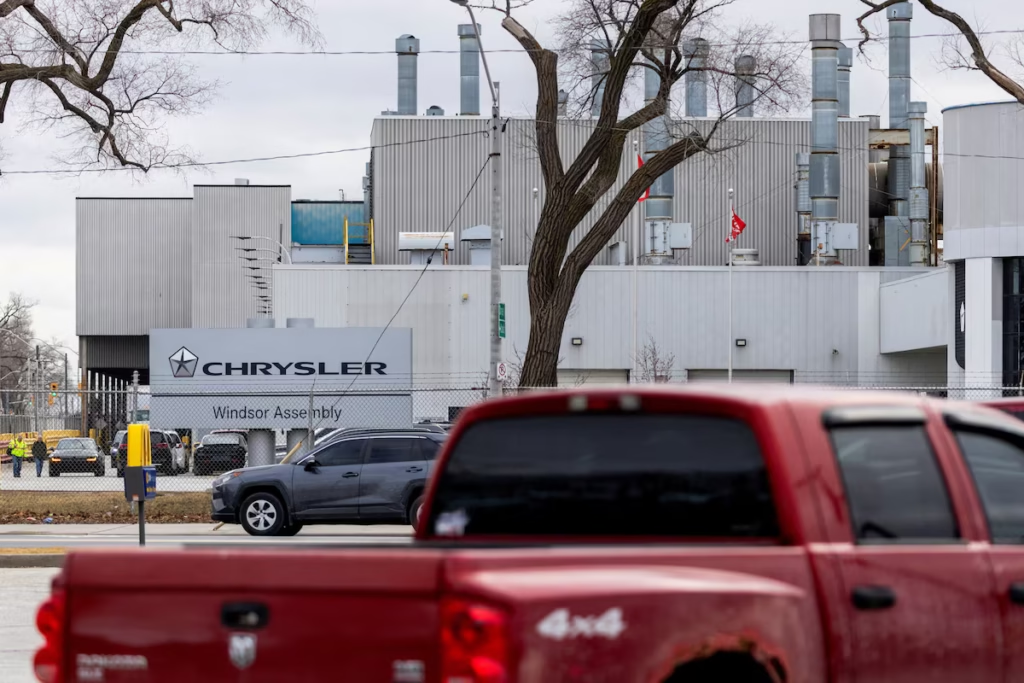
The Canadian auto industry has been thrown into turmoil as automakers, workers, and suppliers struggle to navigate the devastating impact of new U.S. tariffs on imported vehicles. The 25% tariffs, which officially took effect on Thursday, have already begun to disrupt production, with Stellantis becoming the first major manufacturer to suspend operations at its Windsor Assembly Plant for two weeks due to the increased costs.
While still evaluating the full consequences of the tariffs, Stellantis has wasted no time in adjusting its operations. The company announced that it will be pausing production at its Windsor facility, a move that directly affects approximately 3,600 workers. Unifor Local 444 President James Stewart expressed deep concern over the uncertainty these tariffs are creating across the sector.
“Our members are worried about their jobs and frustrated by the unpredictable situation caused by these unnecessary tariffs,” Stewart stated. Prime Minister Mark Carney also weighed in, lamenting the collapse of a 60-year era of close cooperation between Canada and the U.S. in building an integrated automotive industry. “That era has now ended,” Carney said, acknowledging the deep economic repercussions of the trade dispute.
Despite the challenges, Honda and Toyota have opted to continue production. Both companies are actively working with their suppliers and government partners to understand how best to respond to the new trade barriers.
Honda spokesperson Ken Chiu stated that the company is coordinating efforts across North America to assess the broader impact of the tariffs.
Toyota, meanwhile, confirmed that while the situation remains fluid, it has no immediate plans to halt production. The company is collaborating with federal and Ontario officials to explore potential solutions, according to spokesman Philippe Crowe.
While Ford and General Motors have yet to issue public statements, industry analysts predict that additional plant closures and layoffs could be imminent.
Some temporary relief exists for automakers, as tariffs are currently suspended for specific vehicle components that comply with the Canada-U.S.-Mexico trade agreement. However, this exemption is temporary and will depend on how the U.S. government determines the extent of deductions based on American-made parts.
The “Dead Canary” in the Auto Industry
Flavio Volpe, president of the Automotive Parts Manufacturers’ Association, has been warning about the potential shutdowns if tariffs were implemented. He now sees the Windsor plant closure as a troubling sign of what’s to come.
“This is the ‘dead canary’ in the coal mine,” Volpe said.
He emphasized that it is highly unusual for Stellantis to halt production at a newly retooled plant that just launched two new vehicles and is considered one of the company’s most efficient facilities.
Industry expert Sam Fiorani from AutoForecast Solutions also pointed out that while Stellantis’ shutdown may have been influenced by lower-than-expected demand for its new electric Dodge Charger, other manufacturers won’t be able to withstand the tariffs for long.
“Somebody had to be first,” Fiorani noted. “But more closures will follow it’s just a matter of time.”
The Road Ahead: More Disruptions Expected
The automotive industry now faces a period of extreme uncertainty, with major players reassessing their supply chains and production plans. Market volatility, potential job losses, and increased vehicle prices could all be looming realities if the tariffs remain in place.
As companies scramble for solutions, the big question remains will political pressure force the U.S. to reconsider its stance, or is this just the beginning of a new trade war that reshapes North America’s auto sector forever?\
Get more News Headlines On Our Social Platforms And Do Follow.




